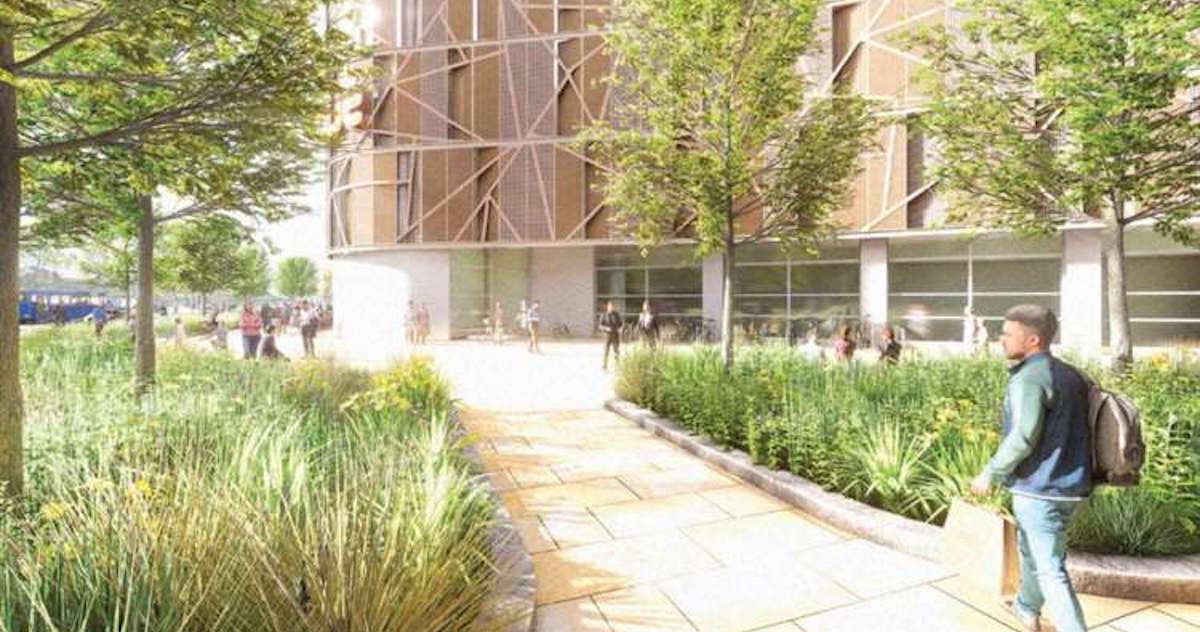Further details of The Grafton Centre redevelopment have been unveiled in a pre-application briefing with Cambridge City Council.
Developers have revealed that almost half of The Grafton is vacant and plan for just 15 per cent of it to be used for retail in future.
The site is proposed to become a new research hub for the life science sector, with new retail, food and beverage units, as well as a new Premier Inn hotel.
It was revealed at the meeting that The Grafton Centre is 48 per cent vacant by unit compared with 18 per cent nationally, with 13 of the centre’s retail units standing empty for more than two years.
Converting the shopping centre into a research hub will provide thousands of jobs from apprentice to PhD level, according to the developers.
When the plans were first shown to the public last year, there was concern about the impact for local residents of the reduction in retail space.
A presentation which was shown to councillors earlier this month revealed that retail will make up just 10,419 sq m of the redeveloped centre’s 70,202 sq m.
A gym will occupy 1,780 sq m, a hotel 4,602 sq m and a cinema 5,198 sq m.
The remaining 69 per cent of the site (48,203 sq m) will be used for laboratory space for life sciences.
The development will also include a 600 per cent increase in the ‘greening’ of the site, although the developers admit this is from a “very low baseline”.
The Pioneer Group says repurposing The Grafton Cantre as an innovation hub for life sciences offers the “sustainable reuse of an existing building in a sustainable location”.
Richard O’Boyle, chief executive officer of Pioneer Group, said: “We’re not just developers that build, lease and then sell. We operate the facility for the long term.
“We will include all our technologies of business, so from an incubator accelerator, scale-up programmes, outreach programmes – and what that means is we’re long-term neighbours for the community.
John O’Shea, centre manager of The Grafton Centre, said: “There are two main factors that have affected retail and retail property in recent years. They are the increasing prevalence of online trade and Covid.
“Some are cutting their retail portfolios back by as much as 40 per cent.
“You can see nationally [and] you can see locally, not just at The Grafton, but we’ll also be aware that the Grand Arcade are changing their plans to include an element of leisure, and we’re all aware that Lion Yard’s original planning application, which was all retail and restaurant dominant, now includes a proportion of offices.
“Looking at The Grafton centre, 48 per cent of our footage is now vacant – that is massively above the national average. Many of our stores are sitting there empty – footfall has not recovered. It’s currently 12 per cent down on pre-Covid levels.
“But because of the decreasing footfall and because of the lack of growth opportunities here, more and more stores are telling us that it’s not sustainable at The Grafton centre.”
Cllr Martin Smart (Lab, King’s Hedges) told the developers: “I get the impression in city centres that no one quite knows what they’re doing, so hopefully you can get it right in the mix.”
“I think there is a job to be done to convince residents that lab space is correctly positioned in the middle of the city centre like you’re planning to do.”
Jonathan Bainbridge, member of the planning team at Bidwells, was keen to point out that retail sat at the heart of the proposals, and it will be centred around “value and convenience” rather than creating competition for the Grand Arcade.
Mr Bainbridge said the developers hope that the project will result in an increase in footfall to Burleigh Street and Fitzroy Street to “try and benefit the traders that are situated there currently”.
But he explained that the developers did not own the land in those streets so have “no control over it whatsoever” in terms of how improvements there are shaped.
“We’ve got to think about that in the context of the millions of pounds of investment that would be going into the public realm that is within our ownership, that we can deliver, and that we can deliver on day one and that the city council can control.
“So we’re not saying that we’re not willing to talk. We do want to talk about it. But at the moment we don’t have an answer to that because it does require partnership and collaboration and we’d like to help facilitate it.”
The scheme does not include any housing beyond retaining what is already part of the site.
One vacant unit will be lost as part of the redevelopment.
The redeveloped site also includes 824 cycle spaces, which would be secure and would include lockers and showers.
The plans also include the use of solar panels on the roof and heat pumps, as well as
rainwater recycling for “at least half of the toilet provision”. The developers are also exploring the use of grey water.
They are also examining whether The Grafton could provide a permanent home for Cambridge Science Centre, which would be an “important component” of the project.
Planning permission has previously been granted for a new building of up to six storeys to replace the three-storey Abbeygate House block.
City councillors unanimously agreed to those plans, which would maintain retail space on the ground floor, with office space on upper floors.
Planning permission for a Premier Inn hotel on the site was previously granted by Cambridge City Council in 2020, but this has not yet been built.
A further planning application for the main Grafton redevelopment project will follow.
Pioneer Group is the life science and technology arm of Trinity Investment Management, which acquired the site in August 2022 from Legal & General.
© Eastern Echo (powered by ukpropertyforums.com).
Sign up to receive our weekly free journal, The Forum here.












